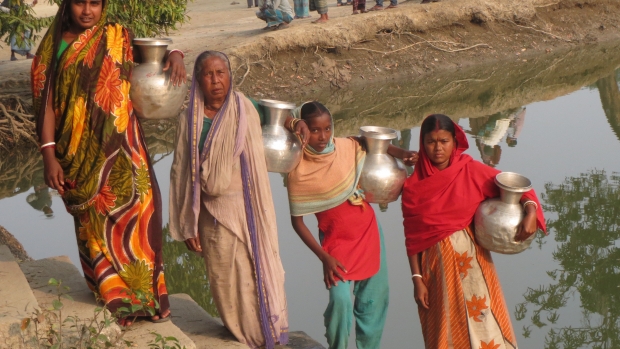Grants :: Small Grant Facilities :: Promoting accessibility to safe drinking water for the vulnerable community in Kultoli village
Promoting accessibility to safe drinking water for the vulnerable community in Kultoli village

Fetching daily drinking water from far away ponds is a daily ... , Shyamnagar, Satkhira, Bangladesh © IUCN, 2014
Objectives
To rehabilitate freshwater ponds in Kultoli village which were degraded in cyclone Aila in 2009
Background
Kultoli is one of the river villages in Shymnagar upazilla near the Sundarbans mangrove forest. An increase in shrimp farming and high levels of salinity in the Chuna River are the prime causes of a scarcity of fresh water for consumption. Existing freshwater ponds have become shallow and salinity has increased following Cyclone Aila. Women of the village, traditionally tasked with obtaining freshwater for the family, spend two hours of their day walking 3 kilometres to the nearest clean water source. The project thus aimed to address the problem by re-excavating fresh water ponds and providing plastic tanks to store rain water as an additional fresh water source.
Target beneficiaries
Primarily women in Kultoli village, but generally all the village residents.
Outputs
Ensured freshwater availability for drinking and household use in Kultoli Village, in particular:
- Five re-excavated ponds, including one pond excavated into a reservoir holding up to 7 million litres of freshwater
- Thirty-three freshwater tanks to store rain water and increase access to safe water for consumption
Accomplishments and challenges
In May 2015, at least 250 Kultoli village families get clean fresh water from the MFF re-excavated ponds, situated only 250 meters from their houses. A task that previously took 2 hours to complete now takes half an hour. The saved time has a profound effect on Kultoli village women's work load. With the extra two hours, women are able to take up a new trade for income generation or spend more quality time with the family.
Contributions to cross-cutting themes
Gender Equality: The spill-over effects of the project's result have profound implications on the ‘invisible’ work carried out by women and children, which often goes unaccounted for as contributing to the productive sphere. In the case of Kultoli village, the amount of time it takes to go to the nearest clean water source has decreased. Villagers have more time for meaningful social activities that were being compromised on before, such as education, income generation, and caring for family members.
Related News
Reducing the 'invisible work load' by access to safe drinking water
Kultoli village, Munshiganj, Shyamnagar, Satkhira, Bangladesh 02 Jul 2015
Country: Bangladesh
Topic: Community Resilence, Gender equality
An increase in shrimp farming and high levels of salinity in the Chuna River are the prime causes of a scarcity of fresh water for consumption in Kultoli village, Shyamnagar, Bangladesh. Existing freshwater ponds had become shallow and salinity had i...
Project Facts
Country
Location
Kultoli village, Munshiganj, Shyamnagar, Satkhira, Bangladesh
Topic
Duration
24th Feb 2014 to 23rd Feb 2015
MFF Grant Amount
BDT 1 million
Implementing Partner
Nakshikantha Mohila Unnayan Sangstha
Nakipur, Shyamnagar, Satkhira
Tel:+88 01714 573942
"Having fresh water nearby gave me an extra two hours every day. With this time, I am now able to raise chickens, tend the garden, cook good meals for my family, and teach my children lessons for school. I also have less quarrels with my husband."
